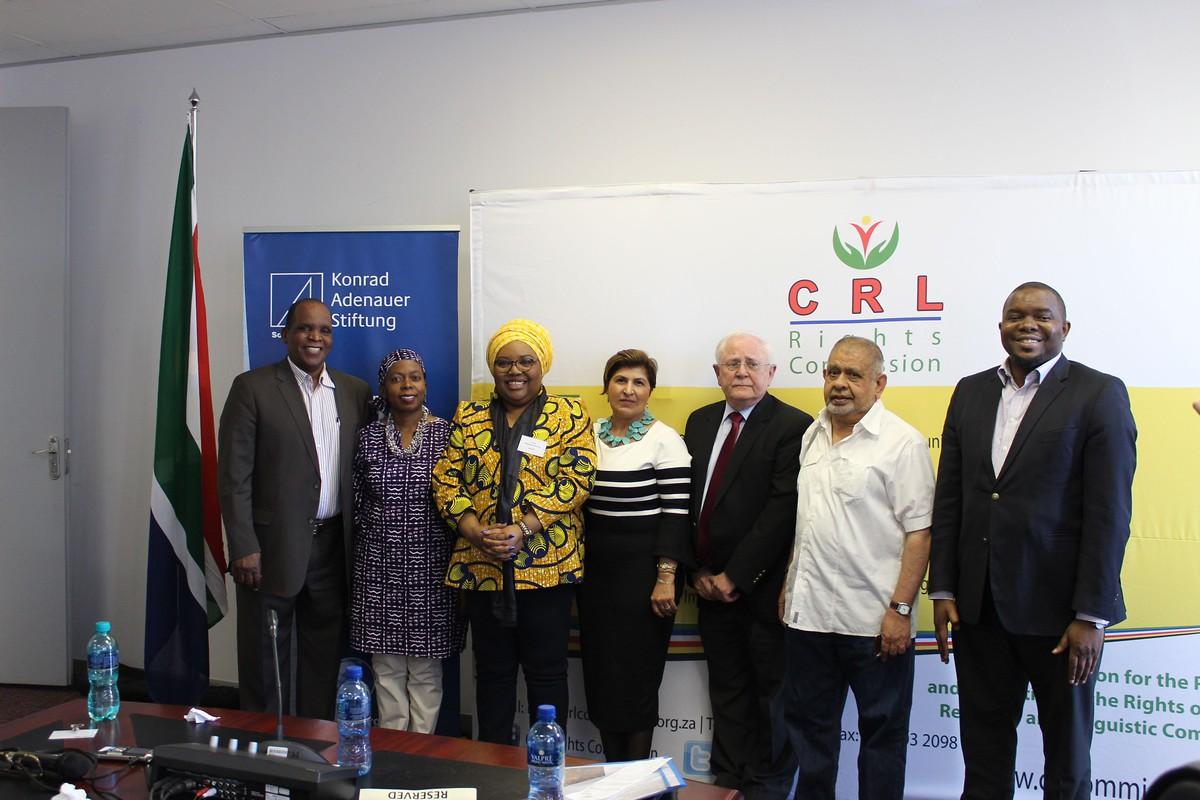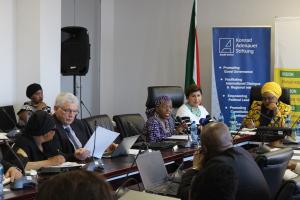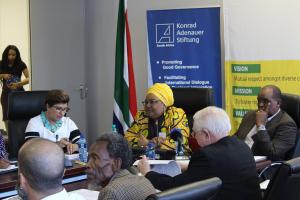Veranstaltungsberichte
On September 14th the CRL Rights Commission in cooperation with the Centre for Unity in Diversity and the Konrad-Adenauer-Foundation (KAS) hosted a roundtable at their Braamfontein offices to share and discuss the latest report of the Commission on the “Commercialisation of Religion and Abuse of People’s Belief Systems”. This timely discussion was chaired by the Commission’s chairperson Ms Thoko Mkhwanazi-Xaluva who elaborated on the issues of religious-based violence and what steps can be undertaken to prevent leaders of religious congregations to abuse their constituencies. Adding to what in the course of the session developed into a lively debate amongst an informed audience and present commissioners was respondent Prof Pieter Coertzen, Extraordinary Professor in Comparative Church Law at the Catholic University of Louvain and at the Faculty of Theology of the University of Stellenbosch and also chairperson of the Council for Religious Rights and Freedom.
Within their introductory remarks both Ms Zohra Dawood on behalf of the Centre for Unity in Diversity and Ms Nancy Msibi speaking for KAS mentioned in regard to the event’s topic the challenge of finding the right balance between religion, custom and the South African Constitution. As the two speakers highlighted, it must be clear that religious freedom also comes with responsibility on behalf of congregational leaders. However, a critical and watchful society is needed when a regulatory body envisions stepping in to interfere with basic rights provided by the Constitution.
In her speech chairwoman Mkhwanazi-Xaluva was outlining the current challenges posed by religious leaders who abuse peoples’ beliefs for the purpose of their own enrichment. It is these new, more aggressive forms of religious practice and changing dynamics within the religious sector based on extreme racism, misogyny and hate speech that according to the Commission require not only a new understanding of religious practices itself but also applicable laws and regulatory institutions in order to cope with them. Therefore, an investigation and identification of the root causes, so to answer the pressing question ‘what makes people to believe what they are told?’ is necessarily required. Referring to the Commssion’s recent “Report of the Hearings on Commercialisation of Religion and Abuse of People’s Belief System” Mkhwanazi-Xaluva went on to highlight the findings of the CRL Rights Commission. Since the report indicates a high number of unregistered religious institutions and a continuing surge of local and foreign religious practitioners, the lack of a coherent database requires a more sophisticated approach towards a baseline-study that can provide more accurate numbers. The commercialization of religion and the financial abuse of practitioners by dubious leaders under the guise of religious freedom is seen as one the most critical features in assessing the current religious landscape, which is being followed and accompanied by highly unconventional preaching styles and cult-like organisational structures. Gender bias and abusive religious experiences with young children and women as its main victims are the most visible results that are bred within these systems. After an excursion into the constitutional and legislative framework which lay the ground for the CRL Rights Commission taking action, chairwoman Mkhwanazi-Xaluva made recommendations for further steps which are also outlined in the report itself. In tackling the lack of data with regard to religious practitioners registration of all religious churches must be made universal, which also involves a clear-cut definition of what constitutes Worship Centres in order to avoid misconceptions. Umbrella organisations responsible for establishing code of conducts should guide religious leaders in their spiritual work. They themselves should be overseen by Peer-Review Committees which should each cover a particular religion and “ensure that there is religious self-regulation and accountability”. The CRL Rights Commission would administer and preside over this process. Mkhwanazi-Xaluva is aware of the state, if following these recommendations, venturing a delicate intrusion into the sphere of religious freedom but “freedom of religion may be limited in order to protect millions of people”, argues the chair.
In responding to the recommendations laid out by the Commission Prof Pieter Coertzen criticises precisely the “number of issues seen as a threat to religious freedom in South Africa”. In putting demands on religions the measures proposed by the Commission would according to Coertzen jeopardise the current cooperative relationship between state and religion. Instead of the regulatory structure demanded by the Commission, he is therefore advocating for a reformulation of the proposal only including a moral code for religions in South Africa which should inspire religious congregations and be therefore based on self-regulation.
In the debate that followed the speakers’ remarks various representatives of civil society showed their sympathy with the CRL Rights Commissions effort and work, indicating that the measures outlined in the report have to be taken further. A delegate representing the Traditional Healers of South Africa opposed Coertzen’s proposal by saying that self-regulation amongst targeted religious leaders could never work since moral decay is to be found at the very roots of their spiritual thinking. However, Coertzen, in defending his point of view, sees the core problem in the regulatory actions coming from the state and “it must not be the task of the CRL Rights Commission to structure religions.”








